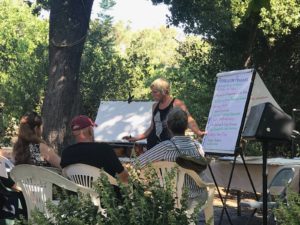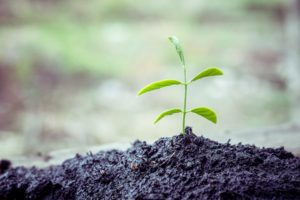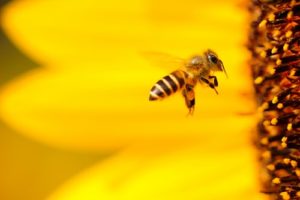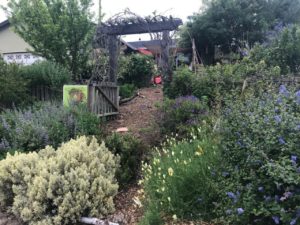Aug 15, 2018
 When it comes to the changing the environment and global climate change, the cause of the problem — humans — can also be the key to the solution.
When it comes to the changing the environment and global climate change, the cause of the problem — humans — can also be the key to the solution.
That was the hopeful message permaculture expert Lydia Neilsen brought to a crowd of listeners on a warm August Saturday morning at Morningsun Herb Farm in Vacaville. The event shared Neilsen’s insights on how permaculture can help restore the local water cycle and was also the official launch of Sustainable Solano’s expansion of its Sustainable Backyard program into Vacaville.
Neilsen began with an overview of the ethics and principles behind permaculture for a crowd where about one-third were new to the concept. Everything stems from the ethics of:
• Earth care (repair, conserve and regenerate)
• People care (seek peace and guard human rights everywhere)
• Fair share (giving back what you have extra of, whether time, money, produce, etc.)
“Our actions have become decoupled from their consequences,” she said. Permaculture involves getting back to that system of relationships.
She then turned to the intricacies of the water cycle and how that has been disrupted — and what can be done on an individual and community level to restore it locally.
“We have been treating rainwater as a nuisance,” she said, referring to how cities pave, pipe and drain water away.
That approach and the removal of plants create dry, dead soil and intensify heat. Rising heat can push water vapor away and create areas that are hotter and drier than if trees and vegetation were present to capture the sun’s rays and not only shade but also to photosynthesize and release oxygen and moisture back into the air. On the scale of a forest, trees work to harvest water vapor, creating low-pressure zones and pulling in more moisture, moving it inland. Take away the forests, and that cycle is disrupted.
“We’ve been impacting it for a long time negatively, and now we can impact it positively,” she said.
The permaculture approach of slowing, spreading and sinking water is a different approach from how rainwater has been treated, keeping water where it does the most good. The other factor in the equation is the need for vegetation.
So much that the world faces is on the global scale, but there is hope to be found in what can be addressed on the human scale.
“What can I do with my shovel to make an impact?” she said. An individual can do a lot through thoughtful observation to determine what needs to be done to help the land — and such efforts can spread. As one crowd member said, “It’s so easy. I mean, I know it’s not easy, but it’s so logical.”
A fruit tree guild — a central fruit tree surrounded by supporting plants that supply mulch, fix nitrogen, attract insects, suppress grass growth and help accumulate nutrients — is “a great place to start,” Neilsen said. Add a greywater system that reuses household water in the garden and it’s a step toward healing that local water cycle by nurturing water and plants on the property. “Imagine if whole neighborhoods were putting in food forests like this,” she said.
Sustainable Landscaping Program Manager Nicole Newell noted that approach is being used in Sustainable Solano’s backyard demonstration food forests. The program, which is taking applications through Sept. 21, will select two private yards and one public space in Vacaville for the demonstration gardens, which volunteers will create through a series of workshops to capture rainwater, install a greywater system and create water-wise, sustainable gardens.
Resources:
During her talk, Neilsen mentioned several books she turns to as resources on the topics she discussed. They include:
Water for the recovery of the climate — a new water paradigm (a research paper)
Hidden Nature: The startling insights of Viktor Schauberger (by Alick Bartholomew)
Permaculture: A Designer’s Manual by Bill Mollison
Rainwater Harvesting For Drylands And Beyond by Brad Lancaster
Aug 12, 2018

The Vallejo Watershed Alliance welcomes Chris Rose from the Solano Resource Conservation District (RCD) to help lead its next restoration project in Vallejo. Since their last successful partnership to restore habitat in the Blue Rock Springs Creek Corridor, the RCD has secured a grant from the California Coastal Conservancy to plant native vegetation around Lake Dalwigk.
Chris will present an overview of the planned restoration work at this year’s annual planning meeting and will discuss how best the Alliance can join in this important work. Following the presentation, calendar activities for the next twelve months will be discussed.
Members of the public are invited to come for the presentation only or stay for the entire meeting. Free refreshments and parking.
The meeting will take place on Saturday, August 18, from 9:00am to 12:00pm at the Dan Foley Cultural Center (Vista Room) located at 1499 North Camino Alto, Vallejo. To RSVP, call 707.652.7812 or email Info@VallejoWatershedAlliance.org.
Jul 31, 2018
By Stephanie Oelsligle Jordan
 Over the past month, I (and others on the Local Food team) have been visiting farmers, ranchers and food producers in Solano County to get a more concrete picture of the current local food supply. Clay Ford of Pleasants Valley Honey Company was on my list. “Do you want to visit the apiary?” asked Clay, as I was arranging a meeting with him. “Sure,” I replied, “that would be great!” On a hot June Friday, I drove out to Soul Food Farm, which is one of five locations where Clay keeps his bees.
Over the past month, I (and others on the Local Food team) have been visiting farmers, ranchers and food producers in Solano County to get a more concrete picture of the current local food supply. Clay Ford of Pleasants Valley Honey Company was on my list. “Do you want to visit the apiary?” asked Clay, as I was arranging a meeting with him. “Sure,” I replied, “that would be great!” On a hot June Friday, I drove out to Soul Food Farm, which is one of five locations where Clay keeps his bees.
Clay’s wife Karen was the first to greet me near the hives. She explained that their honey is hand-spun, and that they keep the hives near farms that use little to no synthetic pesticides or herbicides. I noticed several rows of thriving lavender plants in the distance at Soul Food Farm, which I’m sure held tasty nectar for the bees. Location is important; I learned that bees shouldn’t be kept near or in a forest, because it disturbs the native population.
I figured we’d chat about the honey business and then I’d be on my merry way. Nope! Clay came prepared with a full bee suit for me to don, and invited me to get up close and personal with the Queens and Workers who help make his business happen. Great! (I’ve never done this before!) Karen helped me climb into the suit and then agreed to take some pictures of me. (I figured my two little boys at home would find this super cool – I looked like an alien, after all.)
Bees are certainly fascinating creatures, and it was a rare opportunity to get to see them in action. My thanks go out to Clay, who patiently answered all sorts of questions that I had about how he got into the business, the structure of the hives, the behavior of the bees, and more. I got so involved in learning about the apiary that I was half an hour late for a dinner party that night. But that’s ok…..it was a sweet way to start the weekend.
Look for Pleasants Valley Honey Company at Farmer’s Markets in Vacaville and Fairfield, and at select retailers around the County.
Jul 17, 2018
[Click here for full Daily Republic article]

Sustainable Solano is a grassroots, county-wide movement uniting people and their initiatives aiming to serve the future of Solano County, to promote ecologically sustainable, economically and socially just communities. The organization had been expanding its mission of sustainable gardening since 2011 to include all forms of sustainable local food production (urban agriculture, permaculture, wise water landscape practices, Community Supported Agriculture partnerships and public education). Benicia Community Gardens changed its named to Sustainable Solano in 2016 to reflect its current scope and growing reach to actively engage all of Solano County. Sustainable Solano provides opportunities to local community members across the county to participate in four main initiatives: sustainable landscaping, local food movement, a community conversations speaker series and a sustainable neighborhoods pilot expanding on the sustainability framework to include renewable energy and shared small local solutions. Since 2016, its programs have extended to Vallejo, Fairfield and Suisun City.
Sustainable Solano will be launching its Sustainable Backyard program in Vacaville this August bringing educational, hands-on learning opportunities for residents interested in sustainable landscaping and wise water landscape practices to feed a landscape. This program focuses on transforming lawns and unproductive landscapes into lush, food-producing gardens fed primarily by secondary water sources (laundry-to-landscape greywater system and rainwater) and also brings inspiring talks on sustainable landscape design and permaculture principles.
The Vacaville Sustainable Backyard program will launch on August 11, 2018, with a talk by the permaculture expert Lydia Neilsen at Morningsun Herb Farm in Vacaville. The application period will be open to Vacaville homeowners and community public spaces to apply to become “food forest keepers” and have their yard transformed into a demonstration food forest garden. Highly visible, front-yard lawns are preferred but other types of landscapes (up to 2,000 square feet) are welcome to apply. Details about this expansion and a downloadable application will be available on the website homepage from August 11-September 21st.
Sites are assessed and chosen by Sustainable Solano’s Advisory Board made up of dedicated residents aiming to raise sustainability awareness in Solano County. Site selections are based on criteria such as: yard access, greywater feasibility, sun orientation and a commitment to community education.
There is no financial cost to Vacaville homeowners interested in being a part of this community-building project. The program will offer a series of free, hands-on public educational workshops where locals can learn about permaculture design and be part of the installation of these edible ecosystems fed by secondary water sources. There will be an annual tour of these demonstration food forest gardens.
The Sustainable Backyard program has successfully completed 15 demonstration food forests on both private and public land since the initial launch in 2015. Names given to these gardens are a reflection of the hopes and aspirations of the homeowner as part of their vision for the world they want to live in. Suisun City homeowner and food forest keeper of “A Growing Future” demonstration garden, Cassandra, had her lawn replaced with what she calls “a secure source of local food for my family with a surplus to share with the community”. For food forest keepers in Solano County, these gardens are a source of inspiration, resiliency and connection with neighbors. For Benicia food forest keeper Nam, the garden provided something else aside from birds, bees, flowers, fruits and vegetables. “This garden provided a place for meditation and a peaceful space during difficult times for our family.”
This project is made possible by the funding and support of the Solano County Water Agency.
The Sustainable Backyard will expand to Dixon and Rio Vista in 2019. Visit www.sustainablesolano.org and www.facebook.com/sustainablesolano for updates and details about this expansion.
In addition to self-sustaining, water-efficient landscapes, Sustainable Solano also envisions an environmentally and economically sustainable local food system. In September of 2017, it was awarded a planning grant by the USDA to begin developing a business plan for Community Food Centers in all seven cities. These food centers will serve as a hub for local food activities: CSA deliveries, cooking classes, and community education increasing access to seasonal, locally-produced food, better health for residents county-wide and a stronger local food economy.
[Click here for full article]
Jul 7, 2018
It’s no secret that kids and soil go hand in hand. Kids definitely know where to find it and love to dig in it. While they might find playing in it fun, they may be surprised to learn that soil is the basis for all growing things including the food they eat! Below are some fun videos on dirt and soil for kids to learn about what dirt is made of and how it relates to every meal they eat.
California-based nonprofit Kiss The Ground is a champion for regenerative living and the restoration of soil worldwide. Through policy and media, participation is encouraged from individuals, farmers, communities and governments to build back healthy soil.
 When it comes to the changing the environment and global climate change, the cause of the problem — humans — can also be the key to the solution.
When it comes to the changing the environment and global climate change, the cause of the problem — humans — can also be the key to the solution.

 Over the past month, I (and others on the Local Food team) have been visiting farmers, ranchers and food producers in Solano County to get a more concrete picture of the current local food supply. Clay Ford of Pleasants Valley Honey Company was on my list. “Do you want to visit the apiary?” asked Clay, as I was arranging a meeting with him. “Sure,” I replied, “that would be great!” On a hot June Friday, I drove out to Soul Food Farm, which is one of five locations where Clay keeps his bees.
Over the past month, I (and others on the Local Food team) have been visiting farmers, ranchers and food producers in Solano County to get a more concrete picture of the current local food supply. Clay Ford of Pleasants Valley Honey Company was on my list. “Do you want to visit the apiary?” asked Clay, as I was arranging a meeting with him. “Sure,” I replied, “that would be great!” On a hot June Friday, I drove out to Soul Food Farm, which is one of five locations where Clay keeps his bees.
